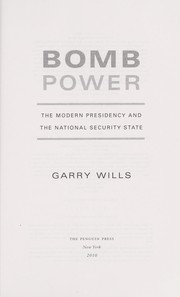Dr. Wills kindly provides a straightforward summary of the book’s central argument in its first paragraph:
This book has a basic thesis, that the Bomb altered our subsequent history down to its deepest constitutional roots. It redefined the presidency, as in all respects America’s “Commander in Chief” (a term that took on a new and unconstitutional meaning in this period). It fostered an anxiety of continuing crisis, so that society was pervasively militarized. It redefined the government as a National Security State, with an apparatus of secrecy and executive control.
Control over “the button” is what Wills refers to as Bomb Power. In the United States, authority over our atomic weapons lies solely in the hands of the sitting president. As Wills argues, this is a departure from the traditional role that the office has played. The US constitution intended the congress to be responsible for committing US forces to wartime activity. In exceptional circumstances when presidents acted beyond the constitution (e.g., Lincoln’s suspension of habeaus corpus during the US civil war), order was ultimately restored following resolution of the crisis. However, the US exited the second world war without an off-ramp for the executive to relinquish authority over atomic power. The Manhattan Project’s secretive origins under Roosevelt’s orders (rather than by direction of congress) established an unbroken line of authority tracing to the executive branch. The apocalyptic power of atomic weapons provided a logic to justify the proliferation of US airbases worldwide. This massive resource commitment was rationalized as being necessary during the Cold War, and was repurposed without much difficulty during the War on Terror.
This has had the effect of rendering congressional and judicial oversight over the executive essentially meaningless. “If the President has the sole authority to launch nation-destroying weapons”, Wills says, “he has license to use every other power at his disposal that might safeguard that supreme necessity.” Restraint from other government branches introduces friction on the deployment of atomic weapons, undermining their deterrant power. The steady expansion of executive powers is easily excused in the name of national security, and seldomly are such extensions withdrawn. Information needed to understand how the office is using powers granted to it is frequently classified. An example Wills highlights is the Air Force’s vigorous attempts to avoid accountability for deaths of military contractors during test flights. Lengthy and protracted legal struggle on the part of surviving family members revealed the flights held no special importance to national defense. It was simply more expedient for the Air Force to avoid taking responsibility for negligently caused deaths.
Wills doesn’t provide a prescription on how we can begin stepping down from the status quo, but I think the book is useful for framing our understanding of the US presidency over the last 75-ish years. Meaningful democratic oversight has been made impossible by the cult of the Commander in Chief and the aura of secrecy that it entails. Any efforts to move away from the atmosphere of permanent emergency will need to contend with them.
